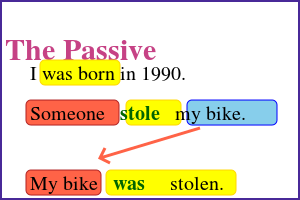Passive/Passive Past: Unterschied zwischen den Versionen
(+ Vorlage:Passive) Markierung: Quelltext-Bearbeitung 2017 |
(l) Markierung: Quelltext-Bearbeitung 2017 |
||
| Zeile 41: | Zeile 41: | ||
{{Fortsetzung|vorherlink=Englisch/Grammatik/Passive/Passive_Present|vorher=Passive - Present simple| | {{Fortsetzung|vorherlink=Englisch/Grammatik/Passive/Passive_Present|vorher=Passive - Present simple| | ||
übersicht=The Passive<br>(Overview)|übersichtlink=Englisch/Grammatik/Passive| | übersicht=The Passive<br>(Overview)|übersichtlink=Englisch/Grammatik/Passive| | ||
weiter=Passiv mit Hilfsverben|weiterlink=Englisch/Grammatik/Passive/ | weiter=Passiv mit Hilfsverben|weiterlink=Englisch/Grammatik/Passive/Passive mit Hilfsverben | ||
}} | }} | ||
Version vom 7. April 2019, 05:48 Uhr
Im Simple Past besteht das Verb im Passiv aus zwei Bestandteilen:
was, were
(Form von "to be") past participle (3.Form)
Interactive exercises
The King of Rock'n Roll
Put in the verbs in the passive form.
Elvis was born on Jan 8, 1935.
He was given a guitar when he was 9.
He was discovered when he recorded a song for his mother.
His first single was released in January 1956.
Military Service in Germany
Put in the verbs in the active or passive form.
In 1958 Elvis Presley got(get) a draft notice for his military service. He was allowed (allow) to finish the forthcoming album.
On March 24, 1958, he started (start) his service in Fort Smith, Arkansas.
He was sent (send) to Germany.
When his ship arrived (arrive) in Bremerhaven, he was greeted (greet) by thousands of German fans.
On March 24, 1958, he started (start) his service in Fort Smith, Arkansas.
He was sent (send) to Germany.
When his ship arrived (arrive) in Bremerhaven, he was greeted (greet) by thousands of German fans.




